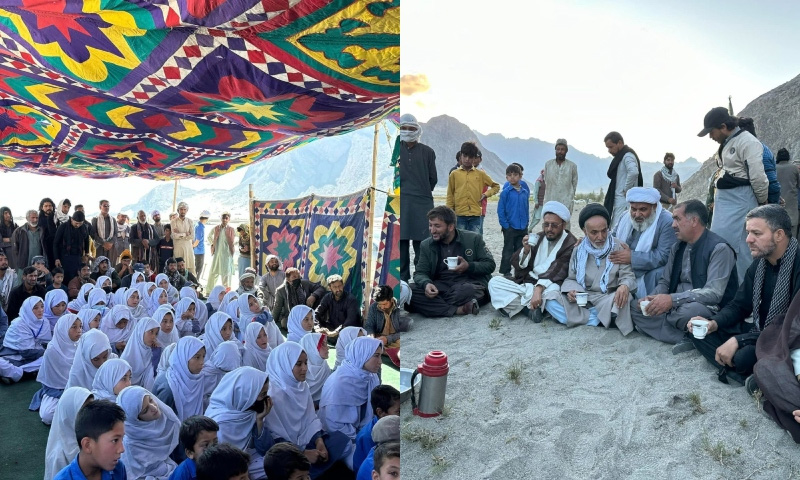- Web Desk
- Feb 19, 2026
Tensions soar in Shigar as sit-in against Sarfaranga verdict continues
-

- Tanveer Abbas Web Desk
- Oct 03, 2024

GILGIT: The situation remained tense in the Shigar district of Gilgit-Baltistan as a sit-in protest against the Chief Court’s ruling, declaring the Sarfaranga Cold Desert “khalisa sarkar” (state land), continued for the 14th consecutive day on Thursday.
On September 19, the court delivered a verdict regarding the ownership of thousands of kanals of land in Sarfaranga, home to the world’s highest cold desert. The court ruled that the “suit properties are owned by the provincial government, and the longstanding entries in this regard have not been challenged.”
The residents of Sarfaranga, alongside the emigrants from the 1947 and 1971 wars, have been contesting ownership of the land for decades. Tensions escalated when the district administration deployed heavy contingents of police to implement the court’s decision. On September 23, structures erected by local residents on the disputed land were demolished.
In a statement, Assistant Commissioner Asghar Khan Ahmed detailed the operation, stating: “A historic operation was conducted in Sarfaranga Cold Desert (Zhe Thang) to remove illegal encroachments. The operation, led by the assistant commissioner and subdivisional magistrate of Shigar district, began at 2:30 AM and continued until 6:00 AM. The operation cleared all encroachments, including rooms, solar systems, and both temporary and permanent walls in the central area of Sarfaranga.”
Also read: Gilgit-Baltistan govt uncovers massive wheat subsidy fraud
According to officials, approximately 3,000 kanals of valuable state land were reclaimed during the operation. The AC led the operation personally, with the heavy presence of police and revenue staff ensuring security and execution.
In response to the ruling, local residents established a protest camp in the Sarfaranga desert. The sit-in has drawn widespread support, with people from various parts of Baltistan joining in solidarity. Protestors, including women and schoolchildren, are demanding the withdrawal of the court’s decision.
Among the protestors is a prominent activist, Wazir Hasnain Raza, who was later arrested by the Skardu police. His detention triggered protests in Skardu, which have since drawn widespread condemnation. The protests, initially centered in Sarfaranga, have now spread to other parts of Baltistan, further heightening tensions in the region.
Opposition Leader in the Gilgit-Baltistan Assembly Kazim Meesam, condemned the arrest of Wazir Hasnain Raza, describing it as an attempt to silence voices advocating for the region’s rights. In a strongly worded statement, Meesam said, “The arrest of the young leader Wazir Hasnain is a move to push the region towards unrest and suppress the voices rising for the people’s rights. This government is engaging in blatant hostility towards the people. They not only despise the voices raised for the region but also have a particular animosity towards the youth.”
He added that the government’s actions are akin to turning Gilgit-Baltistan into another Palestine, “We warned the authorities to stop attacking Skardu under the guise of land disputes. They want to seize lands in the name of ‘khalisa’ and alienate the local citizens. All youth must rise against the arrest of Wazir Hasnain. Those dreaming of crushing the people of Gilgit-Baltistan with oppression are living in a fool’s paradise.”
Meesam called for the immediate release of Wazir Hasnain, stating, “If you cannot grant Gilgit-Baltistan its rightful due, at least stop this oppression. Demanding rights from this government is pointless, but the youth must stay prepared to defend their rights. The current global situation only heightens the sensitivity of Gilgit-Baltistan.”
The opposition leader also warned of serious consequences if the government fails to release Hasnain, saying, “If any untoward incident occurs in Skardu or elsewhere, the blame will rest on those who, instead of safeguarding security, are busy attempting to seize land. The authorities are targeting Shigar, Skardu, and even the people’s lands in Gilgit, fueling hatred among the public with every step.”
Meesam further cautioned that if Wazir Hasnain is not freed, a larger movement led by the youth will arise, and it “will not end with his release alone.”
In a statement, Skardu District Police spokesperson Shuja GM addressed the reasons behind Wazir Hasnain’s arrest. The statement emphasized that “No individual is above the law, and no one will be allowed to break it under any circumstances.” The police spokesperson claimed that Wazir Hasnain had consistently challenged the state’s authority, “repeatedly provoking state institutions and threatening police personnel, even going so far as to tear uniforms and threaten to shoot and throw them into the river.”
The statement further noted that despite the intervention of religious scholars and repeated warnings, the administration had refrained from taking action against Hasnain, who was already listed under Schedule Four. It added that the government’s top priority is to implement the court’s clear verdict regarding the lands allocated to the 1948 refugees in Sarfaranga.
The police spokesperson concluded, stating that Hasnain’s continued defiance of the court’s decision and his actions against state institutions led to his arrest. “Hasnain’s behavior amounted to contempt of court and challenging the authority of the state, making legal action against him inevitable. It should be noted that Hasnain, while under Schedule Four, has persistently violated the laws designated for individuals on this list.” The statement emphasized that “The rule of law is the hallmark of a civilized and educated society.”




